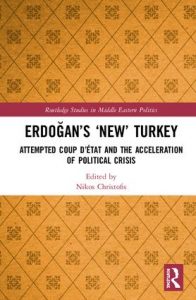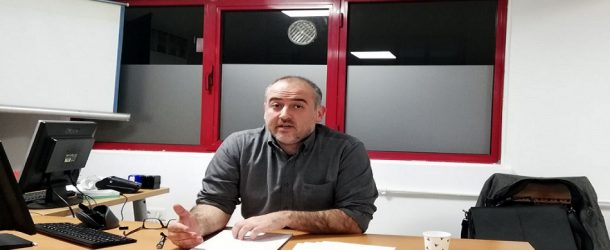Dr. Nikos Christofis is Associate Professor at the Center for Turkish Studies and the School of History and Civilizations at Shaanxi Normal University in Xi’an, China. He is also an affiliate researcher at the Netherlands Institute at Athens (NIA), Greece. He completed his Ph.D. in Leiden Institute for Area Studies (LIAS) at Leiden University, the Netherlands. He has published extensively in English, Greek, Turkish, Spanish, and Chinese. His latest edited book is Erdoğan’s ‘New’ Turkey: Attempted Coup D’état and the Acceleration of Political Crisis published by Routledge.

Erdoğan’s New Turkey
Dr. Ozan Örmeci: Hello, Dr. Christofis. We are keen to sound you out and hear your expert opinion on current developments concerning Greek politics and Turkish–Greek relations. Let us start with the hot topic — the problem of Syrian refugees. Although there is an ongoing agreement on refugee resettlement that was made back in when Ahmet Davutoğlu was Prime Minister of Turkey —with the full support of Greece’s then Prime Minister, Alexis Tsipras— things have turned sour between the Turkish and Greek governments recently. What should we expect from Turkish–Greek relations in, say, the next five years?
Dr. Nikos Christofis: Hello, Dr. Örmeci. First of all, let me say at the outset that the refugee issue is not a Greek–Turkish issue, but a European one, and should be treated as such from the get-go. However, what has become abundantly clear now —not least for the Greeks— is that the EU itself never saw the issue in this way. This becomes more obvious if we consider the difficulties Greece is facing when it comes to the “push back” [i.e., return] of the refugees.
Now, when it comes to Turkey, Turkey has the upper hand, in the sense that it used the issue, and it is still doing so, to achieve vital Turkish national interests, even sometimes by blackmailing the EU. It is not a secret that the AKP government has complete control of the issue. This allows Turkey to play the “refugee card” almost at will. At the same time, as long as the issue remains “Greek”, in the sense that it is confined within Greek territory, Europe seems happy to stay passive, limiting itself to discussing the matter with Turkey on a bilateral basis, without, however, taking a position that would potentially solve the problem, even temporarily. Against this background, I would estimate that Turkey will again deploy the issue in the upcoming months depending on its agenda and its priorities.
This will surely create additional problems. To make matters worse, another Greek-Turkish crisis emerged in recent weeks due to the Turkish–Libyan Agreement. This agreement covers the delineation of maritime zones, creates new EEZs, and practically partitions the Eastern Mediterranean in a way that excludes Greece from the region beyond its current maritime borders. It also blocks the passage of the gas pipeline from the Eastern Mediterranean to Europe without Turkey’s approval.
Now, of course, we are not in a position to know if the Greek government was aware or could have foreseen the Turkish–Libyan Agreement, but it should have been aware of the fact that after Turkey’s militarily successful operation in Syria two months ago, that the Aegean Sea, and in particular, the Eastern Mediterranean, was next on Turkey’s agenda. In that sense, the Greek government was caught by surprise I would say. Regardless, Turkey’s provocative action raises serious concerns about the future of Greek–Turkish relations.
On that point, however, let me mention that Greek-Turkish relations have always been strained, and there is also a distorted opinion in Greece that it is always Turkey’s fault. When it comes to the Aegean Dispute, the Greek governments seem to be unable to understand that constant threats by Greece since 1981 to extend its territorial waters to 12 nautical miles sends an overtly assertive signal. Greece seems assertive also when insisting on airspace out to 10 nautical miles instead of 6, which is against international law. Finally, the Aegean is not, and cannot be, a “Greek lake”. Besides, not a single country whose ships cross the region accept this.

Kyriakos Mitsotakis
Dr. Ozan Örmeci: In Turkey, we do not know too much about the new Greek Prime Minister Kyriakos Mitsotakis’ vision and the promises made to his electorate. Could you please tell us the most important projects of the current New Democracy government?
Dr. Nikos Christofis: The new Greek government has been in power since July. To the extent that we can draw conclusions, I would say that domestically ND is no different from any other aggressive neoliberal governments in Europe or elsewhere in the world, from Hungary to Brazil, and everything in between. First, there are plans for privatization of health that have slowly gotten off the ground, and of education. More generally, everything public seems up for grabs. One example here is discussions about the discovery of ancient Greco–Roman artifacts and structures under the city of Thessaloniki —part of a Decumanus Maximus that was found, the so-called “Pompeii of Byzantium”— during metro station excavation works. The government wants all this privatized.
Beyond this, we should mention the government’s increasing mantra on “law and order”. This doctrine has emerged as one of ND’s central pillars of policy-making. In reality, the approach has been neither “lawful”, nor brought much “order”. Greek citizens are witnessing excessive police force daily, including unlawful entrance into people’s homes — i.e., without a district attorney’s order. Detained people are humiliated when the police conduct strip searches on them in the middle of the street without cause, and so much more. In other words, the ND government is on a slippery slope with the excessive use of force and extreme tactics. One government Minister even stated: “Beating is necessary (to chasten the Greek citizens)”. In general, dissident voices and simple citizens have been vilified and marginalized, using expressions that resemble the one used by the Turkish President Erdoğan, “çapulcu” (marauder). To me, at least, this statement and the abuse of power by the police reveals the Greek government’s vision —namely, a police state where the constitution and the law don’t matter much— for all to see. In other words, it seeks to fashion ideal, obedient citizens in pursuit of neoliberal “utopia”.
When it comes to foreign policy, it is somewhat premature to offer a complete picture of its handling some of the oldest and important topics. Fortunately, the ND seems to accept the Prespa Agreement with which Greece last year solved one of its ‘national’ issues. It is my opinion, the agreement with the new Republic of North Macedonia was an excellent move, and it will help to consolidate a more stable and secure Balkan region. When it comes to Turkey however, things become more complicated as the recent events caught the Greek government by surprise. It seems that Athens is over-reliant on support from the EU, the US, Russia, Egypt, and Israel. Nevertheless, it completely overestimates the value of this support, failing to see that it is mostly rhetorical, without any actual action to back words with deeds. Perhaps a move in that direction —namely, to push the EU and the other countries, perhaps by vetoing some other issues that are vital for the EU itself— might be a good move for Greece. It is my opinion, EU’s inaction gave space to Ankara to follow more assertive policies in the MENA region in general, by playing the “refugee card”.
In other words, we face a contradiction. Greece has verbal support from all these countries, while Turkey is supposedly “isolated” diplomatically – a common argument presented in government circles. However, in fact, Turkey maintains decent, albeit not rosy, relations with both the US and Russia. Most importantly, no country seems willing to put a stop to its foreign policy freelancing, exemplified in the recent Turkish–Libyan Agreement. Against this backdrop, Mitsotakis himself argued that he does not believe there will be any escalation, or “war condition” arising. I believe this as well, but his statement in Germany’s Bild newspaper that he would not be concerned if such a circumstance arose shows that Athens believes that Turkey will become even more isolated if it continues on the current path. I do not believe this will happen in the near future. Let us not forget that since the political defeat in the municipal elections in April 2019, the AKP and Erdoğan himself have been fighting for political survival. Thus, I would say that Erdoğan’s actions, combined with Turkey’s geopolitical, geoeconomic vision in the MENA region, will continue.

Dr. Nikos Christofis and Dr. Ozan Örmeci in Istanbul on December 14, 2018
Dr. Ozan Örmeci: Greece gave its full support to the solution of the Cyprus Problem in 2004 during the Annan Plan referendum together with Turkey, the European Union, and Turkish Cypriots. However, upon the rejection of peace plan by Greek Cypriots, the Cyprus dispute turned into an issue that spoils not only Turkish–Greek relations, but also Turkish–EU relations. Although no significant progress was achieved during Tsipras’ term, he became the first Greek leader to meet with Turkish Cypriots. What is the official position of the current Greek government concerning the Cyprus dispute?
Dr. Nikos Christofis: I believe Tsipras’ meeting with the Turkish Cypriots was the right move — one that should be followed by all Greek governments. You cannot hope for a solution without taking into consideration the other community. This is something that the Greek and Greek Cypriot governments tend to forget. The Turkish Cypriots are not a minority, but an equal community, and equality between the two constituent communities is a sine qua non for a solution to be found. As the latest negotiations revealed, most of the Greek Cypriot community cannot accept equality between these two communities. Since 1974, all Greek and Greek Cypriot governments treat the issue of Cyprus as one of “invasion and occupation”. This is a wrong starting point to begin with. And in the Syriza government, there were voices that shared this opinion. Neglecting what happened before 1974 —and thus, not viewing the issue from its very root— is likely to block the path to a viable, stable solution. Since the stalemate in the negotiations in Crans–Montana, the Cyprus issue has slipped from the top of the agenda of the Greek government. This is understandable when other more urgent issues take precedence. In general, I don’t see how Athens will change its traditional position on Cyprus, which traditionally sees Turkey as an aggressive, expansive, and provocative country. And the latest events legitimize this opinion among foreign policy makers.
Dr. Ozan Örmeci: The Cyprus dispute has morphed into an EEZ (exclusive economic zone) matter as well in recent years in the Eastern Mediterranean due to energy agreements made by the (Greek Cypriot) government of the Republic of Cyprus. What would be a fair and peaceful solution to this problem in your view?
Dr. Nikos Christofis: The discovery of natural gas off the coast of Cyprus, with potential payoffs and pitfalls for all the players, has only complicated the issue. While natural gas has rightly not so far formed an explicit part of negotiations for a possible solution, it lurks unavoidably just below the surface and is a source of potential strategic leverage for all parties. Nevertheless, hydrocarbons in the Cyprus basin (as everywhere), can be a curse rather than a blessing or indeed cause problems before the benefits emerge. Indeed, Turkey’s response to the Trans–Adriatic Pipeline and the East–West energy corridor to prevent any unilateral advantage by Greek Cypriots in the Eastern Mediterranean without the Cyprus issue being resolved is highly likely and could serve only to increase the heated Turkish rhetoric. As Erdoğan asserted recently, alongside a pledge to protect the rights and interests of Turkish Cypriots: “Those who dream of changing the fact that Turkish Cypriots are an integral part of the Turkish nation will realize it is in vain.”
I don’t believe that this (protecting the rights and interests of the Turkish Cypriots) is Erdoğan’s primary goal. Rather, he is looking for leverage. He seeks to implement his own vision in the region, including of course, in Cyprus, and, of course, to grab a share of the resources found in the Aegean, which I don’t find wrong, necessarily. However, since it is easy to create a precedent that could later be deployed to challenge other territorial borders, the pooling arrangements of the Aegean should be made within a strict set of rules and agreements, which must be respected by all parties.
I totally understand Turkey’s standpoint on this —namely: “everybody else in the region has claimed a piece of the pay so why are we being left out?” So under this logic, Turkey “claims” its share of the pie. The way it does so, however, is distinctive and problematic. Turkey ignores international law and prior agreements and causes problems with its neighbors in the region. It is within this context that we notice Turkey’s foreign policy has broadened in scope. Turkey itself is involved now across many different fronts facing several powerful countries or alliances that seek to constrain or restrain the country. And against this backdrop, we notice an intensifying militarization of the country in the sense that the armed forces constitute a crucial tool of foreign policy (e.g., in Syria and Libya). When it comes to Cyprus, it is not the land forces, but the Turkish Navy that has taken center stage, which offers another interesting set of perspectives on the underlying ideology of Turkey’s foreign policy and how Turkey thinks about the region. The ideological construct of the “Blue Homeland” (Mavi Vatan) is nothing more than the perception that the sea itself is an extension of Turkish sovereign territory, an “expansive” if not “expansionist” vision for the country.
In fact, what the “Blue Homeland” doctrine is trying to achieve is more profound—namely, revisionism of maritime zones, on the one hand, and a revision of the Lausanne Treaty settlement, on the other. I believe it was in a recent interview on Turkish television that President Erdoğan indicated where Turkey plans to research hydrocarbon deposits, but also drilling, using a map to show the location east of Crete. Now, the securitization of the sea by Ankara, the agreement with Libya and the statements about revisionism of the Lausanne Treaty—quite understandably— created uneasiness for the Greek government. But it serves only to reinforce—and indeed, intensify— the traditional Greek opinion of Turkey’s aggressiveness.
Having said that, and to conclude, I believe that all of these issues could be solved if there was an all-encompassing discussion about the issues related to the Aegean dispute. This, of course, means that both parties are willing to discuss matters in good faith. However, I am pessimistic. Firstly, Turkey’s policies and actions run counter to such a good faith commitment, and secondly, because of the Greek government’s reluctance to discuss issues other than the continental shelf (of which there are many), as it believes that it is the only topic that both parties should discuss and solve. Thank you!
Dr. Ozan Örmeci: Thanks for sharing your valuable opinions with us. I encourage you to organize a workshop at our university so that we can discuss Turkish–Greek relations in more detail soon.
Date: 19/12/2019
























































